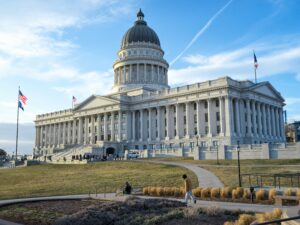Chatbots in Check: Utah’s Latest AI Legislation
With the close of Utah’s short legislative session, the Beehive State is once again an early mover in U.S. tech policy. In March, Governor Cox signed several bills related to the governance of generative Artificial Intelligence systems into law. Among them, SB 332 and SB 226 amend Utah’s 2024 Artificial Intelligence Policy Act (AIPA) while HB 452 establishes new regulations for mental health chatbots.
The Future of Privacy Forum has released a chart detailing key elements of these new laws.
Amendments to the Artificial Intelligence Policy Act
SB 332 and SB 226 update Utah’s Artificial Intelligence Policy Act (SB 149), which took effect May 1, 2024. The AIPA requires entities using consumer-facing generative AI services to interact with individuals within regulated professions (those requiring a state-granted license such as accountants, psychologists, and nurses) to disclose that individuals are interacting with generative AI, not a human. The Act was initially set to automatically repeal on May 7, 2025.
SB 332 extends the AIPA’s expiration date by two years, ensuring its provisions remain in effect until July 2027, while SB 226 narrows the law’s scope by limiting generative AI disclosure requirements only to instances when directly asked by a consumer or supplier, or during a “high-risk” interaction. The bill defines “high-risk” interactions to include instances where a generative AI system collects sensitive personal information and involves significant decisionmaking, such as in financial, legal, medical, and mental health contexts. SB 226 includes a safe harbor for AI suppliers if they provide clear disclosures at the start or throughout an interaction, ensuring users are aware they are engaging with AI.
Mental Health Chatbots
Though HB 452 does not directly amend the AIPA, it is closely linked to the broader AI governance framework established by the law. As part of AIPA, Utah established a regulatory sandbox program and created the Office of Artificial Intelligence Policy to oversee AI governance and innovation in the state. One of the AI Office’s early priorities has been assessing the role of AI-driven mental health chatbots in licensed medical practice.
To address concerns surrounding these chatbots, the AI Office convened stakeholders to explore potential regulatory approaches. These discussions, along with the state’s first regulatory mitigation agreement under the AIPA’s sandbox program involving a student-focused mental health chatbot, helped shape the passage of HB 452. The bill establishes new rules governing the use of AI-driven mental health chatbots in Utah, including:
- Scope: Applies to mental health chatbots, defined as an AI technology that uses generative AI to engage in conversations that a reasonable person would believe can provide mental health therapy.
- Business Obligations: Suppliers of mental health chatbots must refrain from advertising any products or services during user interactions unless explicitly disclosed. Suppliers are also prohibited from the sale or sharing of individually identifiable health information gathered from users.
- Enforcement: Suppliers have an affirmative defense if they maintain proper documentation and develop a detailed policy outlining key safeguards. Among other topics, this policy must describe: the involvement of licensed mental health professionals in chatbot development; processes for regular testing and review of chatbot performance; measures to prevent discriminatory treatment of users.
Utah’s latest round of legislation reflects a continued focus on targeted and risk-based regulation for emerging AI systems. Building on the foundation set by the 2024 Artificial Intelligence Policy Act, the new laws reflect an emerging national trend towards affirmatively supporting AI development and innovation while focusing regulatory interventions on particularly high-risk sectors such as healthcare. Utah’s approach to balancing innovation, regulation, and consumer protection in AI space may produce lessons and influence legislators in other states.

